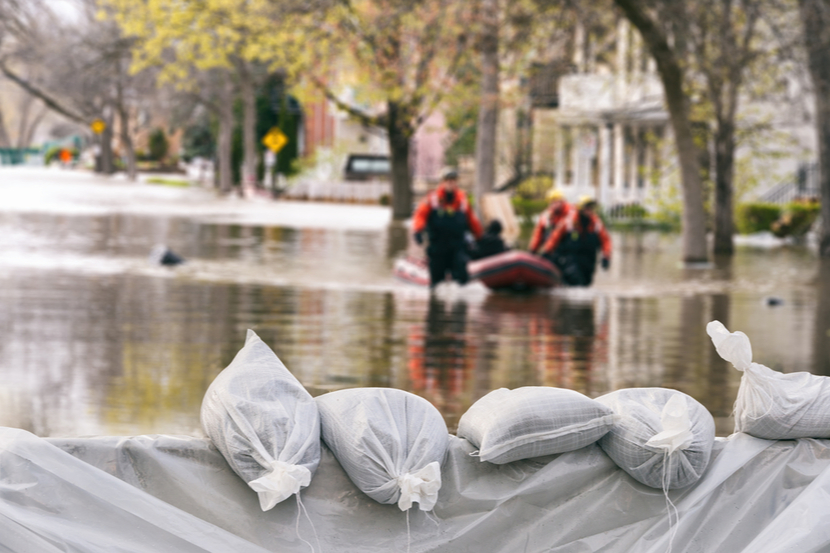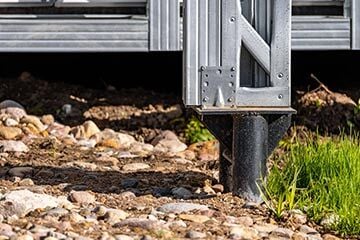If your house gets damaged and becomes unsafe to stay in, it can be an emotional time. You'll want to know that you and your family have somewhere to stay if an emergency happens.
Your home could suffer damages from a storm, fire, or a flood, and become uninhabitable. If it's unsafe to live in your home, you may need to find a temporary place to live until the damage is fixed.
Most home insurance policies should have some kind of alternative accommodation cover. Let's take a look at the details.

What is alternative accommodation cover?
Alternative accommodation cover can provide you with a temporary place to stay if your home becomes uninhabitable due to unexpected floods, fires, storm damage, or leaking water pipes. This type of insurance can ensure you have accommodation until your property is repaired.
If you buy a buildings home insurance policy, alternative accommodation is typically included as part of your cover. It's not always included as standard, so always check over your existing policy documents or before buying a policy!
Alternative accommodation tends to include cover limits, this means there is a maximum claim amount for emergencies. This can vary, so it's best to ensure you have the cover you need.
What does alternative accommodation insurance cover?
Alternative accommodation covers you if your property becomes uninhabitable as a result of:
- Flooding
- Fire
- Subsidence
- Damage caused by a storm
- Water damage from burst pipes
Having this feature means your insurer should help you find a temporary place to stay while your home is being repaired.
Most home insurance policies should have something like this in place, usually covering up to £25-50,000 for alternative accommodation.
If the costs of living there are more expensive than your normal living costs, you should be reimbursed the difference.
What are defined as uninhabitable conditions?
Uninhabitable conditions usually means that the home is either structurally damaged or it's lacking the essentials needed for daily living, such as:
- Running water
- Heating (especially in the winter)
- Electricity
- Sanitary facilities, such as toilets, showers or baths.
Don't worry if you're unsure exactly how your insurer defines uninhabitable conditions. Check the terms and conditions of your policy for more detail, or speak to your insurer for peace of mind.
Who pays for alternative accommodation?
If you have alternative accommodation cover, your home insurance should pay out if you need to claim. Many insurers choose where you stay temporarily, others let you select alternative accommodation, but they must accept your suggestion.
This is why your alternative accommodation amount is important and why you need to ensure you have enough cover if you need to claim.
If you're renting, your landlord could be required to provide alternative accommodation if the property needs repairs, for example. Whether they're obliged to or not entirely depends on your tenancy agreement.
How much am I covered for?
Exactly how much you're covered for is typically set out in your policy documents. Some policies offer a greater cover amount than others. So, it's something you should consider when you buy alternative accommodation in the first instance.
In other cases, the amount you can claim for a temporary place to stay (your alternative accommodation) isn't a fixed number. Instead, it's calculated as a percentage of your home insurance's total coverage. So, how does that work?
Well, let's say your main buildings insurance is set at £500,000, for example. If your policy states that your temporary accommodation cover is 20% of that total, that would mean you'd have a limit of £100,000 to use for renting a place while your home is being repaired.
Are my possessions covered?
Buildings insurance generally covers a temporary place for you to live when your home is uninhabitable. But when it comes to your belongings, contents insurance tends to provide you with alternative accommodation cover for storage costs.
This can help you protect your possessions if your temporary accommodation does not offer you enough storage space.
What about my pets?
If you have a pet at home, and you need to claim for alternative accommodation, contact your insurer. You might be able to request temporary accommodation that allows pets to stay with you.
If this isn't possible, alternative accommodation could provide you with cover for fees relating to kennels or boarding. Just be aware that there might be a set limit to cover these fees!
What's an example of alternative accommodation?
Where possible, your home insurance company should find temporary accommodation that allows you reasonably live your life as normal.
Your insurance policy should enable you to get on with your daily life. And the effects of any disruption should be minimal.
For families, you should still be able to:
- Continue to get children to school
- Continue commuting to work, or continue working from home
- Carry on being involved in any other regular activities you do
Depending on the emergency you face, you might have to be a little more flexible.
For example, if your entire neighbourhood is flooded, you might find yourself given alternative accommodation a little further away than you'd normally choose.
But any extra commuting and transport costs should be covered under your policy.
When can I claim for alternative accommodation?
If your house has been damaged structurally by a storm, fire or flood, you make a claim on your home insurance. Here’s what might happen if you decide to make a claim:
- Your insurance company sends a loss adjuster to look at the damage and the effect it’s had on your living conditions
- They'll have a thorough look at the property and report back their findings to your insurer
If they decide your house is uninhabitable and you need to move out, they should process your claim.
If your home still has all the essentials in place, the adjuster might suggest it's fine for you to continue living there.
Repairs can be upsetting and disruptive to your routine. But it might be less upheaval for you and your family to stay in the property if the repairs aren’t going to take too long.
How to make a claim?
If a sudden unexpected event causes damage to your home, you can typically claim on your home insurance. This needs to be addressed first to get the ball rolling as far as your claim is concerned.
If you claim, your insurer is likely to send a loss adjuster to assess and report the extent of damage. The loss adjuster should also advise what repairs are necessary and determine whether your home is fit to live in.
It could be that your home is judged as safe to continue living in while repairs are carried out. But, if your home is deemed uninhabitable, your insurer should accept an alternative accommodation claim. You'll be able to discuss your situation, what cover you have available and your options for temporary accommodation.
What else should I consider about alternative home accommodation cover?
Storing any undamaged possessions could be expensive. Make sure you know what your policy will cover if you have to put belongings in storage while any damage is being fixed.
If you're a tenant and the home you rent becomes uninhabitable, you shouldn’t have to pay rent. But don’t assume your private landlord will have to put you up somewhere else in the meantime.
So, check your rental agreement and make sure you know where the responsibility lies. If you're a council tenant, you should be provided with somewhere else to stay by your local authority.
If you have pets, your policy should cover for them to come with you. If you can’t do that, it should cover the cost of putting pets into kennels or catteries while your home is being repaired.







